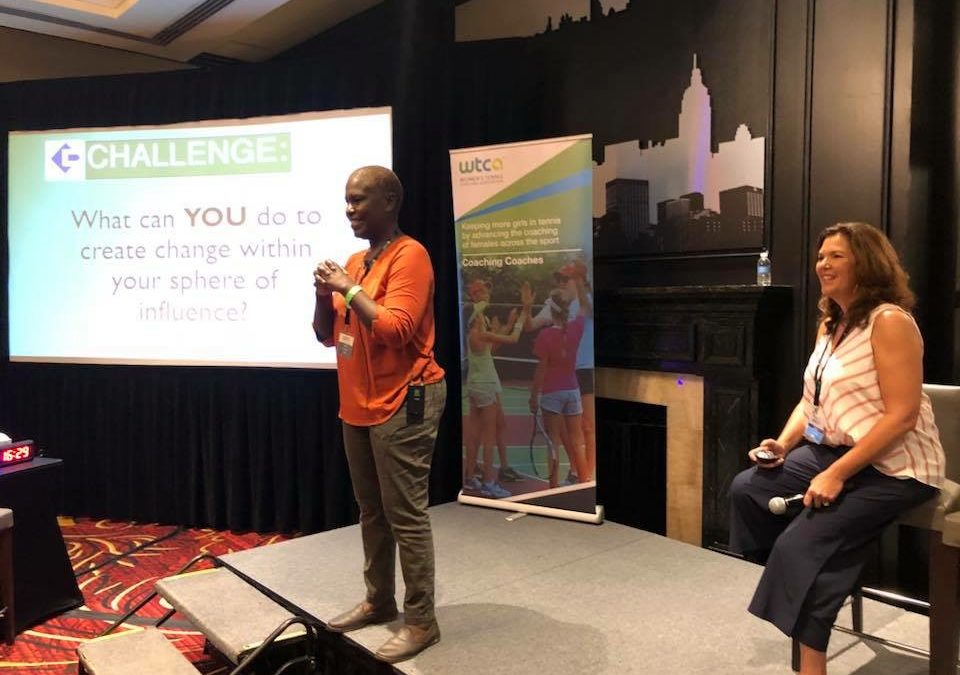“I believe in the power of sports in changing lives.” A simple, yet powerful statement made by Dr. Liz Odera, who is an award-winning coach, motivational speaker and published author, among numerous other accomplishments. Across her various roles, Dr. Odera has dedicated her life to helping others achieve their goals through mentorship.
Growing up in Kenya, Dr. Odera began her career in tennis as a professional player. After finishing her career, she began coaching when her two children decided to take up the sport. She attended workshops across the globe to build her coaching prowess, which helped her two children earn scholarships to play at the collegiate level. Meanwhile, she was able to hone her skills and become one of the most successful tennis coaches in Africa.
Dr. Odera transitioned the skills that she learned through coaching into a successful mentoring system with over 7,000 children and 300 coaches training in tennis, basketball, soccer and rugby. She then founded Sadili Oval Sports Academy in Nairobi, a nonprofit organization that uses sports and education to empower children to improve their health, reduce poverty, and improve learning for a better future.
In addition to the Sadili Oval Sports Academy, Dr. Odera launched the Girl Power Clubs Africa project, which provides leadership training to teenage girls and gives them the tools to tackle issues that prevent them from achieving their goals. Through all of the platforms she has created, Dr. Odera’s primary goal has been to use sport as an avenue to create positive and meaningful change.
At the WTCA, we strive to create positive change in the sport of women’s tennis by giving coaches the necessary resources to work successfully with female athletes. To achieve this goal, we look to professionals like Dr. Odera to help educate and mentor the coaches in our organization, which is why we invited her to share her wisdom at the recent WTCA Conference in NYC.
At the conference, Dr. Odera collaborated with Lisa Stone of ParentingAces to deliver a presentation entitled: “Mentoring & Coaching in Women’s Tennis: Making the Case for Change.” The duo spoke on the importance of both males and females working together in leadership roles, as well as the significance of taking ownership of your actions as a coach.
“There is a great value in having the WTCA because there is training available to female coaches and coaches of female athletes,” said Dr. Odera “Coaches need to take advantage of this opportunity. Everyone can influence their community. The only way people begin to see you as a leader for change is when you act to create that change.”
Dr. Odera also addressed the necessity for coaches to face their fears head-on so that they may push beyond fear to develop as a coach and person. She asked each and every coach at the conference to pick one flaw that they would work to change when they arrived home “There’s now harm in changing,” she said. “If you want to survive in this profession, you have to grow.”
Helping others achieve this personal growth has been a specialty of Dr. Odera’s throughout the entirety of her career, whether it be through coaching or personal mentorship. In coaching, she believes that mentorship is particularly important for female athletes because she has found that girls tend to learn best from having positive role models.
“Mentorship is leading by example,” she explained. “For coaches, it means understanding where your players are coming from. You have to understand them. You have to guide them through the process, not talk to them and walk away. You also have to take the steps to realize each other. You have to help the athletes that you coach realize their goals, and by doing that, you realize your own goals.”
Understanding your athlete is another key to finding coveted success, according to Dr. Odera. “The role of the coach is critical in improving the player. If you don’t understand where their mind is and where their heart is, you won’t be able to guide them.”
When a coach takes on a mentorship role, finding this understanding with their athlete becomes a much easier task. Once you begin to truly understand an athlete, you are able to communicate with them in a way that wouldn’t be possible without a cohesive partnership. Part of forming this partnership means helping your athlete to believe in themselves.
“Believing in yourself truly takes you to a different level,” said Dr. Odera. “It’s almost spiritual. You begin to believe you can do it and accept that you are in charge of making success happen. My job is to give people the confidence to believe in what they can do. I help them look into themselves and see what they can achieve. Confidence helps you perform beyond what you think you’re capable of achieving.”
Creating positive change in the sport of women’s tennis starts with the work of individuals like Dr. Liz Odera. Together, coaches everywhere have the ability to start a movement of mentorship within the sport, helping female athletes to achieve goals that they would have never even thought were possible.

